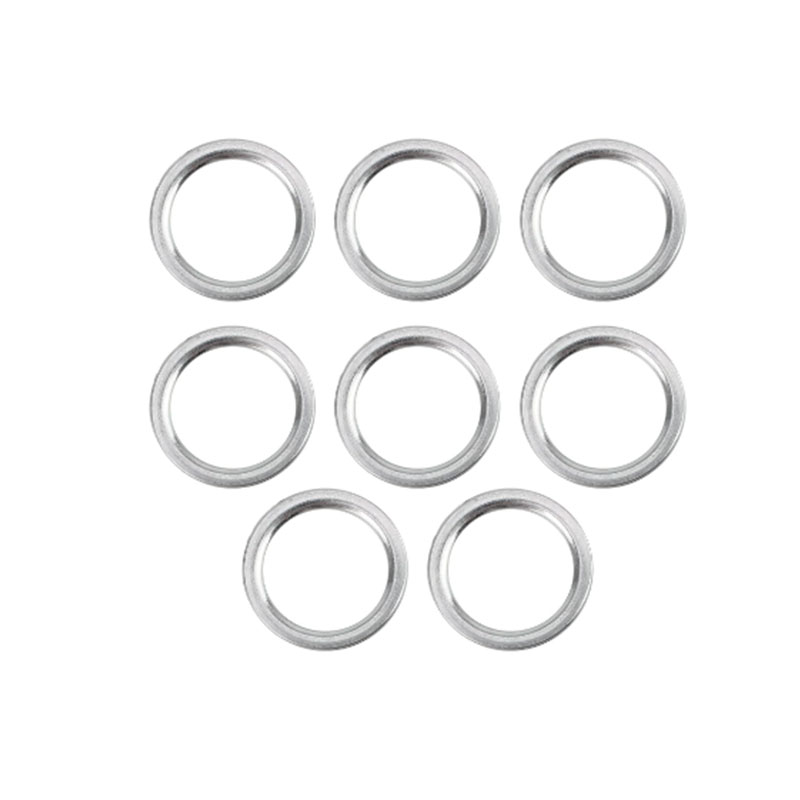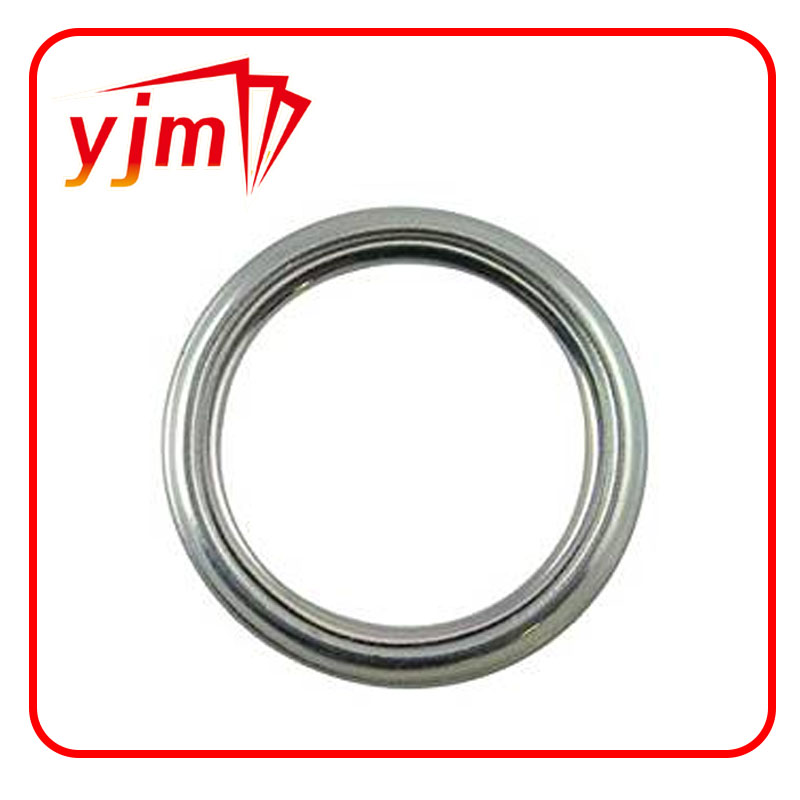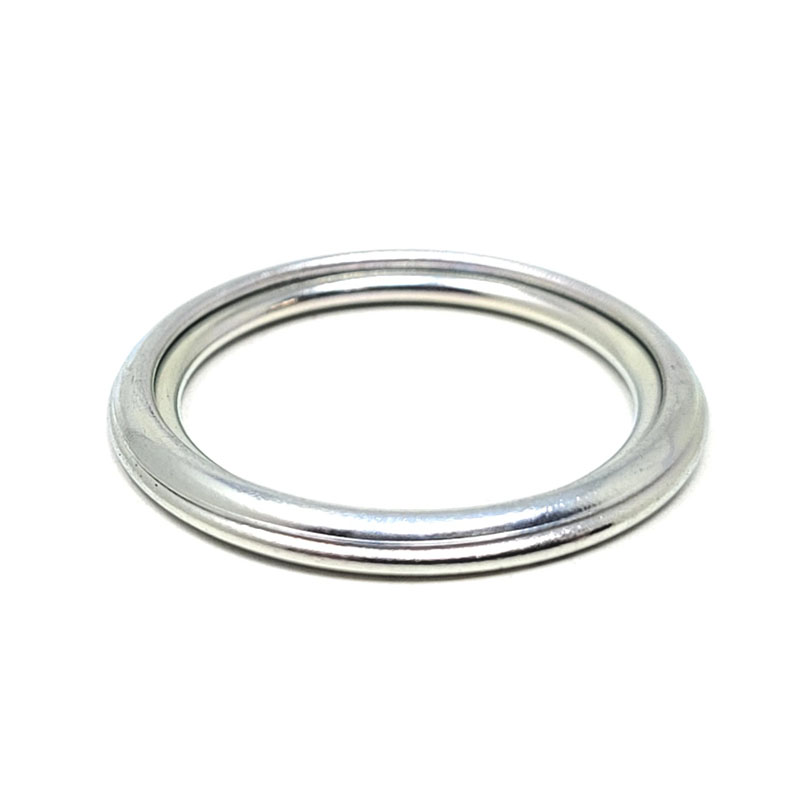Rubber Crush Washer: Leak-Proof Oil Drain Plug Seals
The Crucial Role of Advanced Sealing: Understanding the rubber crush washer
In high-stakes industrial and automotive applications, the integrity of fluid systems is paramount. Leaks, even minor ones, can lead to significant operational inefficiencies, environmental hazards, and costly equipment damage. This necessitates precision-engineered sealing components, among which the rubber crush washer plays a vital, often underestimated, role. Specifically, in critical maintenance procedures like an crush washer oil change, a new oil plug crush washer is indispensable for ensuring a leak-proof seal. This article delves into the technical aspects, manufacturing processes, application scenarios, and market dynamics surrounding high-performance oil crush washer technology, providing insights crucial for B2B decision-makers and technical professionals.

Precision Engineering: The Manufacturing Process of a Robust rubber crush washer
The production of a high-quality rubber crush washer is a sophisticated process that combines material science with precision manufacturing. These components are designed to deform under compression, filling microscopic irregularities between mating surfaces and creating a hermetic seal. The typical process flow emphasizes strict quality control at every stage:
- Material Selection and Compounding: The choice of rubber is critical, often NBR (Nitrile Butadiene Rubber) for oil resistance, FKM (Fluoroelastomer) for high-temperature and chemical resistance, or EPDM (Ethylene Propylene Diene Monomer) for weather and ozone resistance. These polymers are compounded with curing agents, fillers, and other additives to achieve specific mechanical properties (e.g., Shore A hardness, tensile strength, compression set).
- Metal Core Preparation: For composite crush washers, a metal core (e.g., steel, copper, aluminum) is often utilized for structural integrity and enhanced crushing capability. This core undergoes processes such as stamping, forging, or CNC machining to precise dimensions, ensuring a perfect fit with the rubber component. Surface treatments may be applied to promote adhesion.
- Bonding and Vulcanization/Molding: The rubber compound is typically molded onto the metal core. This can involve compression molding, transfer molding, or injection molding. During this stage, the rubber undergoes vulcanization (curing), a chemical process that transforms the raw rubber into a durable, elastic material. Adhesives are often applied to the metal core to ensure a strong, permanent bond with the rubber.
- Trimming and Finishing: After molding, excess rubber (flash) is removed through precise trimming operations. This ensures clean edges and accurate dimensions, preventing interference during installation and ensuring optimal sealing performance.
- Quality Control and Testing: Each batch undergoes rigorous testing to meet international standards such as ISO 9001 for quality management, ASTM D2000 for rubber products, and SAE J200 for automotive rubber materials. Tests include dimensional inspection, hardness testing, compression set, tensile strength, elongation at break, fluid resistance, and functional leak tests. This ensures a consistent service life and reliable performance in target industries like automotive, petrochemical, metallurgy, and water supply & drainage. The advantages are evident in typical application scenarios, such as energy saving through leak prevention and superior corrosion resistance due to material selection.

Evolving Requirements: Industry Trends in Sealing Solutions
The sealing industry, particularly for components like the rubber crush washer, is continuously influenced by several key trends. A primary driver is the increasing demand for enhanced performance under more extreme conditions – higher temperatures, aggressive chemicals, and greater pressures. This pushes material science towards developing advanced elastomers with superior resistance properties and longer service life, reducing maintenance frequency and costs.
Environmental regulations play a significant role, emphasizing leak prevention to minimize pollution and improve overall system efficiency. This mandates zero-leakage solutions, making the consistent performance of crush washers more critical than ever. Furthermore, the growth in electric vehicles (EVs) introduces new challenges, as thermal management systems and battery cooling circuits require specialized sealing solutions capable of handling diverse coolants and broader temperature fluctuations. Miniaturization and lightweighting trends also influence design, requiring compact yet robust washers that do not compromise sealing integrity.
Technical Specifications: Key Parameters of a High-Performance rubber crush washer
Selecting the appropriate rubber crush washer requires a thorough understanding of its technical parameters. These specifications dictate the washer's suitability for specific operating environments and performance requirements. The following table illustrates typical parameters for a high-quality oil drain screw gasket:

Product Specification: Oil Drain Screw Gasket Oil Crush Washer 12157-10010
| Parameter | Specification | Unit |
|---|---|---|
| Part Number | 12157-10010 | - |
| Material (Rubber) | Nitrile Butadiene Rubber (NBR) | - |
| Material (Metal Core) | Galvanized Steel | - |
| Inner Diameter (ID) | 12.1 - 12.3 | mm |
| Outer Diameter (OD) | 21.0 - 21.2 | mm |
| Thickness | 1.9 - 2.1 | mm |
| Hardness (Shore A) | 70 ± 5 | Shore A |
| Operating Temperature Range | -30 to +120 | °C |
| Max Pressure Rating | 10 | MPa |
| Fluid Compatibility | Engine Oils, Transmission Fluids, Water, Air | - |
| Compression Set (22h @ 100°C) | < 20% | % |
These specifications ensure that the washer provides reliable, long-term sealing performance in demanding automotive environments.
Diverse Applications and Core Technical Advantages
The versatility and reliability of crush washers make them indispensable across a multitude of industrial and automotive applications. Their ability to conform under pressure ensures a tight seal, even on imperfect surfaces. Key application scenarios include:
- Automotive Oil Systems: The most common application is as an oil plug crush washer for engine oil drain plugs and transmission fluid drain plugs. During an crush washer oil change, replacing the old washer with a new one is critical for preventing leaks, which can lead to engine damage and environmental contamination.
- Hydraulic and Pneumatic Systems: Used in high-pressure fluid lines, pumps, and valves to prevent leakage of hydraulic oil or compressed air, maintaining system efficiency and safety.
- Fuel Systems: Ensuring leak-free connections in fuel lines and tanks, which is paramount for safety and environmental protection.
- Industrial Machinery: Sealing critical interfaces in heavy machinery, manufacturing equipment, and processing units where various fluids are managed.
- Petrochemical and Chemical Processing: Utilizing materials resistant to aggressive chemicals and extreme temperatures to ensure containment and safety in refineries and chemical plants.
The technical advantages of these advanced sealing solutions are multifaceted:
- Superior Sealing Integrity: The composite design allows the rubber to deform and fill surface imperfections, creating a robust, leak-proof seal that traditional metal washers cannot achieve.
- Vibration Dampening: The elastic properties of the rubber component help absorb vibrations, reducing the likelihood of loosening connections and extending the life of mating components.
- Chemical and Temperature Resistance: Through specialized rubber compounding (e.g., FKM, HNBR), these washers can withstand a wide range of operating temperatures and resist degradation from various fluids and chemicals.
- Corrosion Prevention: The rubber layer often protects the metal core and mating surfaces from galvanic corrosion, especially in environments with dissimilar metals or corrosive media.
- Cost-Effectiveness: By preventing expensive leaks and reducing maintenance frequency, these washers offer significant long-term savings, contributing to overall operational efficiency.
Vendor Selection and Customization in Sealing Technology
Choosing the right supplier for a rubber crush washer is as critical as the product itself. Reputable vendors distinguish themselves through their commitment to quality, technical expertise, and ability to provide tailored solutions. Key considerations for vendor comparison include:
- Material Quality and Sourcing: Verification of raw material consistency and adherence to international standards.
- Manufacturing Precision and Technology: Advanced molding and bonding techniques, tight dimensional tolerances, and automated quality control.
- Certifications: ISO 9001, IATF 16949 (for automotive), and other industry-specific certifications demonstrating adherence to rigorous quality management systems.
- Research & Development Capabilities: A vendor's ability to innovate, develop new materials, and offer advanced testing.
- Technical Support and Engineering Expertise: Availability of experienced engineers to assist with design, material selection, and troubleshooting.
Beyond standard off-the-shelf products, the ability to provide customized solutions is a significant differentiator. Customization can involve:
- Specific Dimensions: Tailoring inner diameter, outer diameter, and thickness to perfectly match unique component interfaces.
- Optimized Material Compounds: Developing custom rubber formulations for superior chemical resistance, extreme temperature performance, or specific mechanical properties.
- Integrated Design Solutions: Working with customers to design integrated sealing components that simplify assembly or enhance overall system performance.
- Special Coatings: Applying coatings for reduced friction, enhanced chemical resistance, or improved installation.

Authoritative Insights and Application Case Studies
Our commitment to excellence is underpinned by adherence to stringent industry standards and a proven track record with leading manufacturers. With over 20 years of experience in precision sealing solutions, our products, including the rubber crush washer, meet or exceed certifications like ISO 9001 and IATF 16949, ensuring consistent quality and reliability for our global clientele.
Case Study 1: Enhanced Automotive Oil Pan Sealing
A leading automotive OEM faced recurring warranty claims related to minor oil leaks from engine drain plugs. Analysis revealed that traditional metal washers were susceptible to deformation inconsistencies and could not reliably compensate for minor surface imperfections. Our engineering team collaborated with the OEM to design a custom rubber crush washer featuring a precisely bonded NBR compound over a galvanized steel core. This solution offered superior elasticity and compression characteristics, ensuring a consistent and robust seal. Post-implementation data showed a 25% reduction in oil leak-related warranty claims within the first year, significantly improving customer satisfaction and reducing costs.
Case Study 2: High-Performance Sealing in Petrochemical Equipment
In a demanding petrochemical processing plant, flange connections handling corrosive media at elevated temperatures required frequent maintenance due to seal degradation. Standard sealing washers exhibited limited chemical resistance and premature hardening. We engineered a specialized crush washer utilizing a high-performance FKM elastomer bonded to a stainless steel core. This customized solution provided exceptional resistance to aggressive chemicals and thermal cycling. The client reported an extension of their maintenance cycle by 30% for these critical flanges, leading to reduced downtime and substantial operational savings.
Trust and Transparency: FAQ, Fulfillment, and Support
Building lasting partnerships in the B2B sector relies on trust, transparency, and dependable support. We address common inquiries and outline our commitment to customer satisfaction:
Frequently Asked Questions (FAQ)
- Q: Why is it crucial to replace the rubber crush washer during an oil change?
A: A crush washer is designed for single-use compression. Once crushed, it conforms to the mating surfaces, creating a perfect seal. Reusing an old washer, which has already been deformed, significantly increases the risk of oil leaks due to insufficient sealing capability. - Q: What materials are available for your crush washers?
A: We offer a range of rubber compounds including NBR, FKM, EPDM, HNBR, and Silicone, combined with metal cores of steel (carbon steel, stainless steel) or aluminum, to meet diverse application requirements for chemical resistance and temperature ranges. - Q: How do I select the correct size and material for my application?
A: Our technical sales and engineering teams are available to provide expert consultation. We require specifications such as internal/external diameter, thickness, operating temperature, fluid compatibility, and pressure requirements to recommend the optimal solution. - Q: What is the typical service life of your crush washers?
A: Service life varies significantly based on material, operating conditions, and application. Our products are designed and tested for extended durability, often exceeding OEM specifications. We provide detailed material data sheets and expected service life guidance for specific applications.
Lead Time & Fulfillment
We maintain efficient production lines and robust supply chain management to ensure timely delivery. Standard product orders typically have a lead time of 2-4 weeks. Custom-engineered solutions may require 6-10 weeks, depending on complexity and tooling requirements. We offer global shipping capabilities and work with clients to optimize logistics for JIT (Just-In-Time) inventory management.
Warranty Commitments
All our products are backed by a comprehensive 12-month warranty against manufacturing defects and material failures under normal operating conditions. This commitment reflects our confidence in the quality and reliability of our sealing solutions.
Customer Support
Our dedicated customer support team and technical engineers are available to assist with product selection, technical inquiries, and after-sales support. We provide responsive communication and collaborative problem-solving to ensure optimal performance of our products within your systems.

Conclusion
The advanced rubber crush washer is more than just a sealing component; it is a critical element underpinning the reliability, efficiency, and safety of countless industrial and automotive systems. From preventing environmental contamination during an oil change to ensuring the integrity of high-pressure fluid lines, its precise design and material science are paramount. Partnering with a specialist supplier who prioritizes quality, customization, and technical support ensures that your operations benefit from state-of-the-art sealing technology, contributing to long-term performance and peace of mind.
References
- ASTM International. "Standard Classification System for Rubber Products in Automotive Applications." ASTM D2000.
- International Organization for Standardization. "Quality management systems — Requirements." ISO 9001:2015.
- Society of Automotive Engineers. "Classification System for Rubber Materials for Automotive Applications." SAE J200.
- M. J. Forrest. "The Role of Elastomers in Advanced Sealing Applications." Journal of Materials Science and Engineering. Vol. 45, No. 3, 2018.
- Global Automotive Research Council. "Trends in Automotive Fluid Management Systems." 2023 Report.
-
Seal 12x20x5: Precision Radial Shaft Seals for Industrial Reliability
News Nov.24,2025
-
Seal 12x18x5: Essential Guide to Specifications, Applications & Vendors
News Nov.24,2025
-
Understanding Seal 12 20 5: Applications, Specifications & Industry Insights
News Nov.23,2025
-
Durable Oil Seal 85x110x12 – Reliable Sealing Solutions for Industry
News Nov.23,2025
-
Durable and Precise Oil Seal 75x95x10 for Efficient Machinery | YJM Seal
News Nov.22,2025
-
Durable Oil Seal 75x100x10 for Reliable Industrial Performance | YJM Seal
News Nov.22,2025
-
High-Quality Oil Seal 65x90x10 | Durable & Reliable Sealing Solutions
News Nov.22,2025
Products categories















